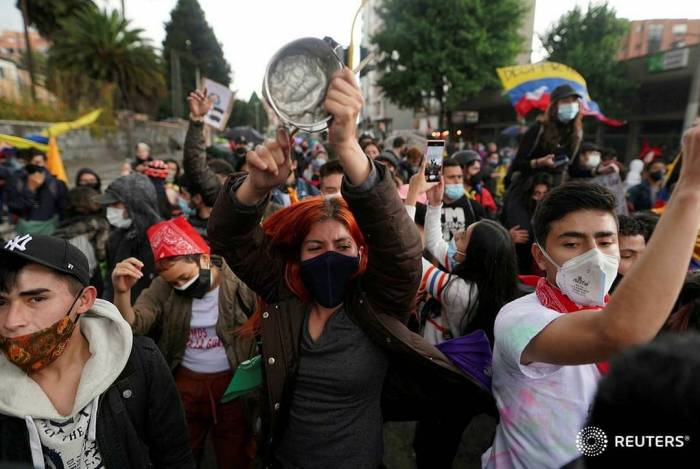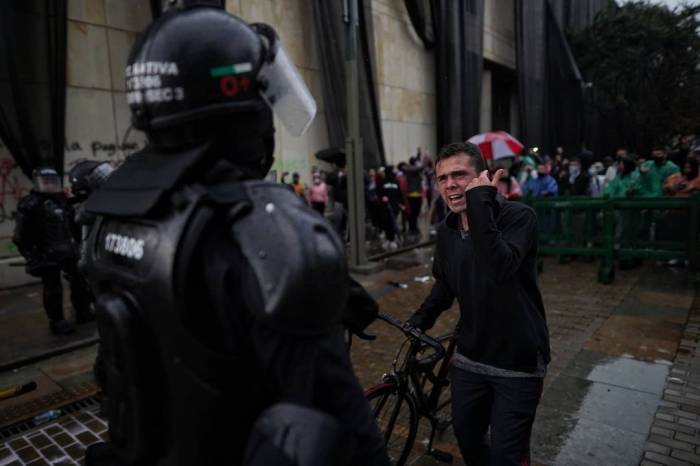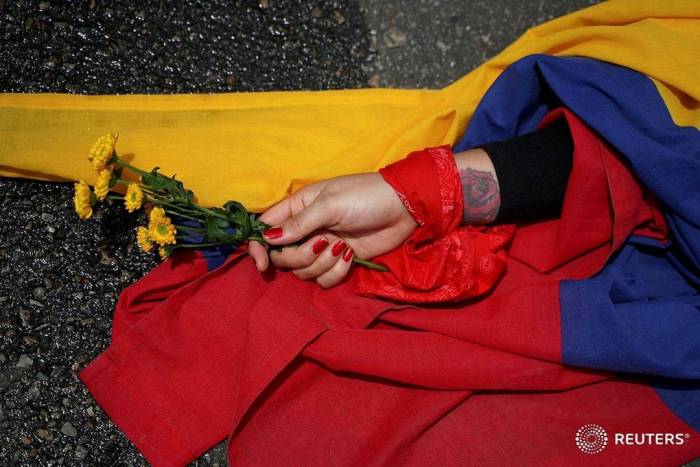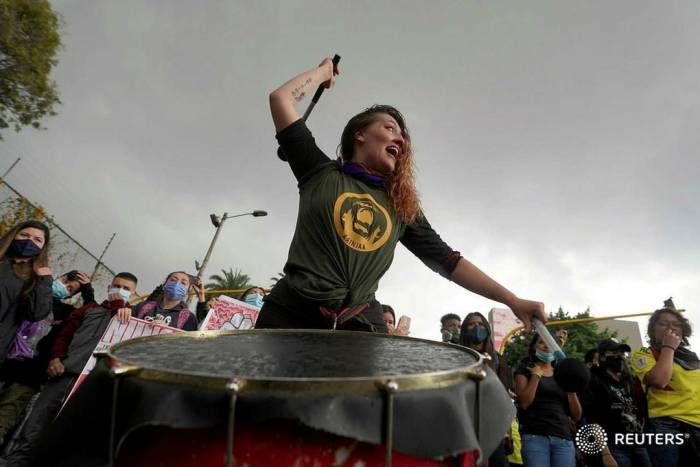The rights to freedom of demonstration, health and a healthy environment are non-negotiable and must be fully respected everywhere across the world. Based on these principles, 350.org makes public its support for the peaceful demonstrators who are taking to the streets in several Colombian cities, demanding changes in social, health and economic policies. Above all, they are demanding an immediate end to police, military and state violence against unarmed citizens.
“It is unacceptable that the Colombian government allows repressive and extremely violent police actions against a large majority of unarmed and peaceful citizens, who are only exercising their right to demand changes that they consider essential for the country”, said Ilan Zugman, 350.org’s Latin America director.

Young protesters are taking to the streets to demand more inclusive policies from the Colombian government. Photo: Nathalia Angarita / Reuters – @nathalianph
According to AFP, and also based on reports from the Colombian NGO Temblores, the police actions are leaving a terrifying toll. In just the first three days of the protests, there were a total of 1181 cases of police violence, 92 victims of abuse of force, 26 deaths, four victims of sexual aggression, 672 arbitrary detentions and 12 aggressions to the eyes of the demonstrators.
Colombian media outlets that extensively cover environmental and human rights issues – such as La Silla Vacía, Cero Setenta and Pacifista – are also recording the irresponsible actions of the police in several areas, as well as the enormous peaceful response of thousands of Colombians to these abuses.

A striker and a policeman argue at a protest: 350.org and many other organizations are calling for the Police to immediately stop the abuses. Photo: Credit: Nathalia Angarita / Reuters – @nathalianph
“Colombia’s social movements and youth are setting an example of courage and commitment by taking their demands for fairer and more efficient social, health and economic policies to the streets of the country. However, the police response has been terrifying and reprehensible. The people who died and those who were assaulted or threatened deserve a proper investigation into these abuses of authority and assurances that they will have safety and freedom from now on”, said Zugman.
Opportunities for a Just Recovery
It is also worth noting that, although the government’s tax reform proposal was the trigger for the protests, the demonstrations already encompass other demands, such as the desire for urgent public policies that put the most vulnerable communities at the centre of attention.
Climate youth groups, indigenous associations and several NGOs are expressing concern about the government’s reform of the public health system, which could subsequently undermine healthcare in rural and poor areas of the country. They are also highlighting the inadequacy of measures to combat the pandemic, as well as the insufficiency of financial support to help the most vulnerable families in need.
Two issues closely related to 350.org’s mission also appear on the agenda of a considerable part of the protesters: the need to guarantee the safety and dignity of climate activists and the implementation of environmental policies that will lead Colombia to a just and complete energy transition.

Protests that began over disagreements with new fiscal policies were expanded to include demands such as protection for community leaders and better health care for rural communities. Photo: Nathalia Angarita / Reuters – @nathalianph
Colombia holds the shameful title of ‘world champion country’ for the highest rate of assassinations targeting social and environmental leaders around the world, including indigenous leaders who end up being killed for defending their territories from encroachment and environmental destruction. A very important part of the Colombian civil society movement is therefore demanding that the State act much more responsively to protect these people and do justice to those who have already been killed.
In this sense, the cases that stand out are those of the “false positives”, as are called the innocent young people, generally of very low income, who were executed by the military forces under the argument that they were involved in guerrillas. These murders were made in order to make people believe that the security policies of the government of the day were producing results.
Fracking would aggravate Colombia’s current problems
On the environmental side, the national government’s insistence on expanding oil, gas and coal extraction and, in particular, on promoting the use of fracking for gas production, at a time when the world desperately needs to keep fossil fuels in the ground, is striking.
Besides the fact that fossil fuels clearly have their days numbered in the global marketplace, these investments can lead to soil, water and food pollution. Moreover, the fossil fuel industry concentrates its revenues, as we know, and does nothing to prepare the country for the global economic challenges of the coming decades.
Another point of concern is the repression against anti-fracking protesters in the region known as Medio Magdalena, where the government is trying to develop a pilot fracking project. As the 350.org team has expressed in this letter sent to Colombian President Iván Duque and in events about the issue, activists in this region are being threatened and intimidated for their defense of a territory free from the serious harm caused by fracking.
The Colombian government needs to guarantee the protection of constitutional rights to free expression, dignity and life, which are not being respected in this case.

A protester plays a drum as strikers march: civil society organizations are calling the Colombian government to invest in better social services. Credit: Nathalia Angarita / Reuters – @nathalianph
“Development is done by including people in decision-making and supporting the improvement of the quality of life of communities. The case of fracking in Colombia goes in the opposite direction in both aspects. The country has the opportunity to review its public policies in this area and invest in a Just Recovery immediately, as many of the protesters are calling for,” says Ilan Zugman.
- For ideas for a Just Recovery in Colombia and around the world, see these sessions from 350.org’s April 2021 Global Gathering for a Just Recovery.